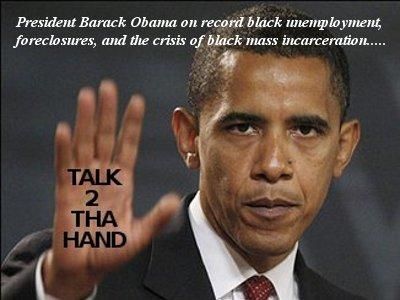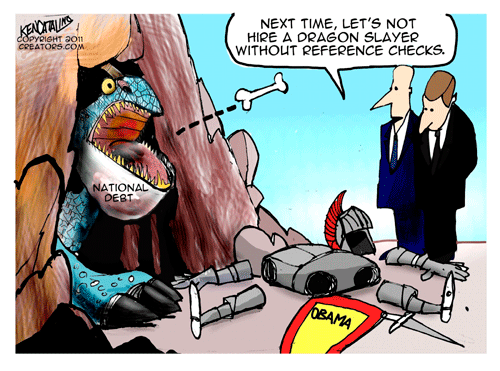 What does “Winning The Future”, the inept slogan of the Obama 2012 campaign, really mean for the middle class and poor, especially the African American, Hispanic and other minority communities? What would re-electing Obama in 2012 mean for the economy? For Glenn Ford at the Black Agenda Report, it means a further economic decline, especially for the Black community where unemployment is still more than twice that for Whites.
What does “Winning The Future”, the inept slogan of the Obama 2012 campaign, really mean for the middle class and poor, especially the African American, Hispanic and other minority communities? What would re-electing Obama in 2012 mean for the economy? For Glenn Ford at the Black Agenda Report, it means a further economic decline, especially for the Black community where unemployment is still more than twice that for Whites.
“Barack Obama must bear direct responsibility for the relative Black decline, both as candidate and president.”
Black wealth has virtually disappeared. Data gathered prior to 2007, when the full scope of the subprime mortgage catastrophe was just becoming known, showed median Black family wealth at about $5,000, one-twentieth of the median white family’s $100,000 holdings. Since then, the bottom has fallen out from under whole communities, with Blacks hit by far the hardest. By the second quarter of 2010, Black home ownership had declined from its 2007 level of 48 percent to 46.2 percent, a 3.7 percent drop, and still falling – a guarantee that median Black household wealth is well below the $5,000 registered in 2007. (Median wealth for single Black women at the top of their earning capacity, ages 36 to 49, was precisely $5 – five dollars! – in 2010.)
Barack Obama must bear direct responsibility for the relative Black decline, both as candidate and president. As election year 2008 began, Obama took the most pro-banker, laissez faire capitalist position on home foreclosures of the three major Democratic presidential candidates. John Edwards backed a mandatory moratorium on foreclosures and a freeze on interest rates, while Hillary Clinton supported a “voluntary” halt and $30 billion in federal aid to homeowners. But Obama opposed any moratorium, mandatory or voluntary, and balked at cash for homeowners and stricken communities.
Perhaps it would be in the best interests of the majority to not re-elect Obama, as Ian Welsh argues,
America is in terminal decline. There may be a lot of ruin in a nation, as Keynes said, but that amount is not infinite. The next chance you get to turn this around you will be starting from a much worse position. A lot more pain will be unavoidable.
Obama is not turning things around, what he is doing is negotiating with Republicans how fast the decline will be, and how much and how fast it is necessary to fuck ordinary Americans in order to keep the rich rich. If Obama wins another term, he will continue to negotiate the decline, then, odds are very high, a Republican will get in, and slam his foot on the accelerator of collapse.
This is why Obama must lose in 2012. I would prefer that he lose to a Democrat in a primary, then that Democrat wins, but he must lose regardless. If he loses to a Republican, then 2016 you get a chance to put someone in charge who might do the right things (or even just some of them.)
No, those odds aren’t good. They suck. Every part of them sucks. And even if you get a Dem in 2016, you’ll probably choose the right most candidate, just like you did last time, and he’ll go back to negotiating with Republicans over what parts of the corpse of America’s middle class they should dine on next. “No, no, eat one kidney first, they only need one to survive, so that’s not too cruel.”
But it is still your best chance. Otherwise you’re looking at full, Russian-style collapse. What comes out the other end, I don’t know, but you really won’t enjoy getting there.
Look at what is happening now in Wisconsin, Michigan and Ohio where the state governments where turned over to the Republican Tea Party. Even moderate Republicans and Independents are in revolt. What is happening there is happening now at a Federal Level. Reclaiming the House and throwing out the right wingers in the Senate, replacing them with more progressive, liberal representation is our best hope and needs to be our focus. It is the only ay to counter the right wing agenda of the White House.

 Paul Krugman:
Paul Krugman:  On this day in 1859,
On this day in 1859,
Recent Comments